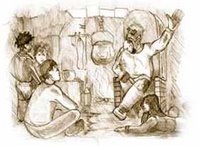Recently, I’ve been contemplating the relationship between doctrine (or dogma, i.e. doctrinal reflection) and narrative. That is, the interaction between the systematized, structured, propositional form that dogma assumes versus the non-propositional, plot-driven, engaging flow embodied in story.
I’ve become convinced of the necessity of both. There are perhaps some who would argue that dogma is an unnecessary, purely human construct that is laid over the top of the Scripture (which has much narrative) to somehow commandeer our thinking away from that which the narrative presents. And I do readily admit that dogma can become overemphasized, preferred in what is a somewhat false dichotomy between it and narrative, of which we shall see more below. Still, as has been recently discussed in my doctrine class, the rational mind cannot escape its learned (and some might say, God-given) pattern of thinking logically, propositionally, and because of this, everyone utilizes a dogmatic format (therefore, doctrine) when engaging with Scripture. It may well be a construct, but it is an unavoidable construct, if we are to be at all thoughtful about Scripture.
To return to the earlier point, however, in this age of the dying of modernity, when story is reemphasized and propositional truths are often treated as suspect, aren’t we compelled to explore once again the dangers of overemphasizing a purely dogmatic engagement with the Scriptures? I would argue that we, as the 21st century  discovering a path that engages with both dogma and narrative as fully as possible. Truly, to reduce those narrative portions of Scripture (OT histories, NT gospels, Acts) to purely linear, dogmatic propositions steals away from the power of their original presentation in story form. Story grips us in a way that dogma cannot. Story compels us more than, engages different sensitivities than, and is more dynamic and organic than dogma. Further, if we purport to be calling people to be reconciled to God (2 Cor 5:20), to love God and their neighbor (Mt 22:34-39), then surely story piques those relational elements within us—in a very needful manner—more so than dogma, and therefore becomes a powerful evangelistic implement.
discovering a path that engages with both dogma and narrative as fully as possible. Truly, to reduce those narrative portions of Scripture (OT histories, NT gospels, Acts) to purely linear, dogmatic propositions steals away from the power of their original presentation in story form. Story grips us in a way that dogma cannot. Story compels us more than, engages different sensitivities than, and is more dynamic and organic than dogma. Further, if we purport to be calling people to be reconciled to God (2 Cor 5:20), to love God and their neighbor (Mt 22:34-39), then surely story piques those relational elements within us—in a very needful manner—more so than dogma, and therefore becomes a powerful evangelistic implement.
For instance, if you were just to meet someone called Josh, what would be more compelling, relationally: for Josh to tell you that he was a compassionate man or for Jack to relay a story from his past that demonstrated his compassion embodied? In this age, perhaps any age, the former methodology would be immediately regarded with suspicion: a claim is made that sounds boastful, inauthentic, and about achieving some purpose, like Josh wanting to gain favor and admiration. The second however, if presented well, can draw the audience in, present compassion as a characteristic trait of Josh’s, but leaves it nestled into the surrounding story. Its innate humil ity leaves the hearer to pick out (or not!) the subtle flavor of Josh’s compassionate nature from the complex simplicity of the glass of wine that is his story.
ity leaves the hearer to pick out (or not!) the subtle flavor of Josh’s compassionate nature from the complex simplicity of the glass of wine that is his story.
Of course, the story is meant to achieve something, and it cannot do so without dogmatic engagement. Josh’s story that conveys a sense of his compassionate nature is nothing if I have no understanding of what it means to assign someone the label of compassionate. Hence, dogma is indispensable.
I suppose the concept I’m getting at is that modernity-driven evangelicals, much like me, have tended to place too much value on doctrine (perhaps because it was the best defense against enlightenment critiques of religion), relative to narrative. We’ve assumed that propositional truth is primarily what moves people forward in the call to Christ. We’ve forced our story to be nothing more than a vehicle to doctrine, instead of a necessity, which eventually, inevitably, led it to be obsolete.
Now, however, when film and television have paired their stories with images and music, the deliciousness of story has been taken to a new level, and we find ourselves struggling to keep up. It is a worthwhile struggle, though. God had foreseen that when he sent his Son to become part of our story, or rather, when we have been made a part of his.
The evangelists of this age may well be the storytellers.







